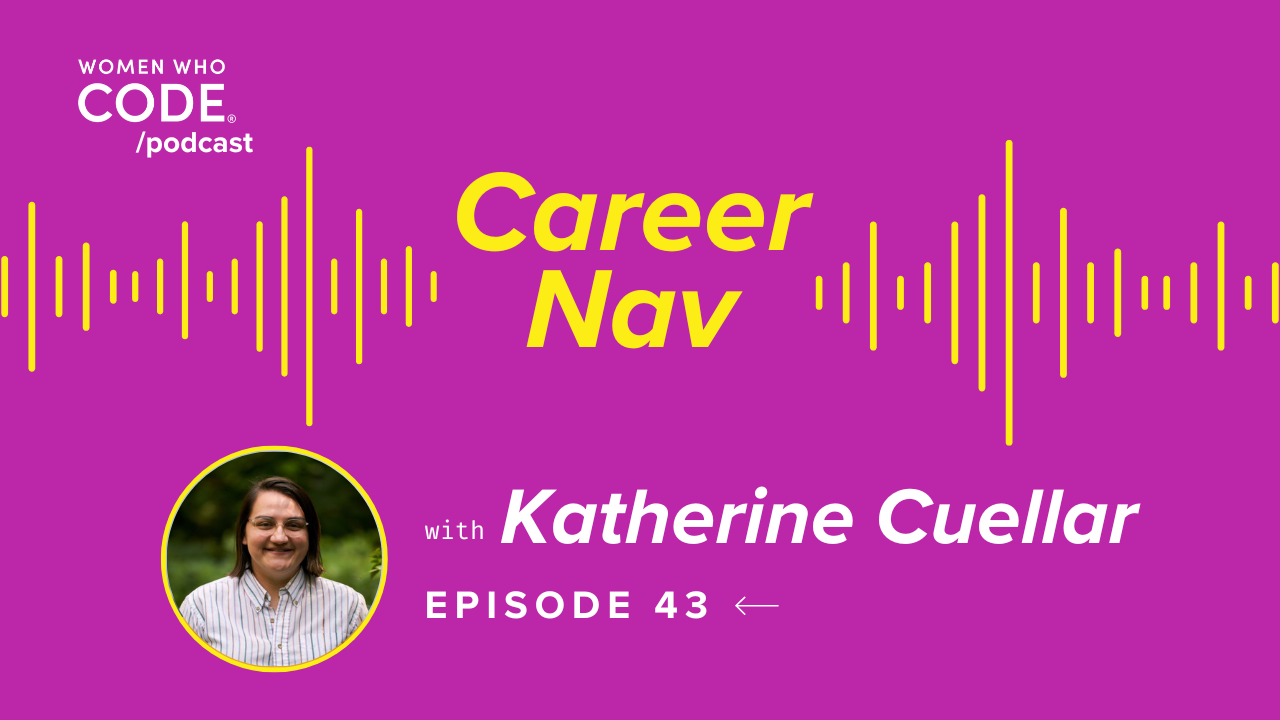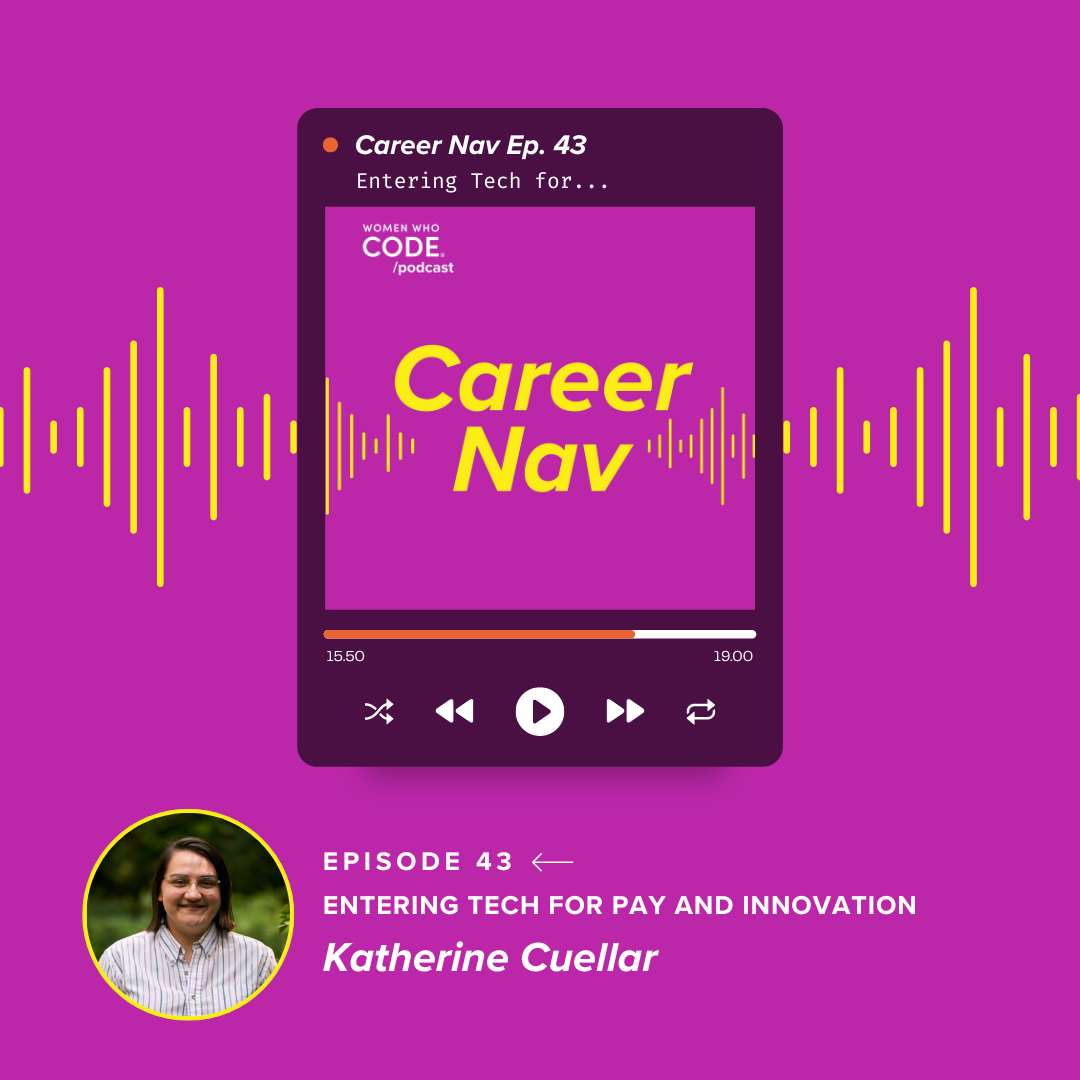Career Nav #43: Entering Tech for Pay and Innovation
Written by Katherine Cuellar

Women Who Code Career Nav 43 | Spotify – iTunes – Google – YouTube – Text
Sarah Healy, Digital Design Manager at Women Who Code, interviews Katherine Cuellar, JavaScript Implementation Manager at AudioEye. They discuss why accessibility is important to Katherine, the experience of moving from a contracted position to an employee in management, and the benefits of creating an LLC if you are a contracted employee.
How did you get started in tech?
I started transitioning into tech in 2018, but I got my first job in the industry in 2020. I found myself wanting something more in my professional life. I wasn’t learning anything new anymore and wanted that to change. In tech, especially in software engineering, you’ll never know everything.
Tell us a little bit about your current job and the day-to-day duties.
I am currently the JavaScript Implementation Manager. I manage a team of about 20 developers. Of those 20, 14 or 15 work more than one or two days a week. My team’s job is to write JavaScript remediations for client sites to make their sites more accessible to people who use assistive technology. Whether that is a screen reader, if they use just a mouse or a keyboard to navigate, or if they are visual users, our software helps the client websites that we’re a part of becoming more accessible to those people who use those technologies so that it is easier for them to navigate. They’re able to interact with everything that a visual mouse user can interact with. My team’s main job is going through each client site, finding those issues of web accessibility, finding the inaccessible things, and writing JavaScript remediations to fix them.
What do you love most about your job, especially regarding web accessibility?
In the work I get to do every day, I’m making changes on client sites that will positively affect a user’s experience and potentially increase the number of users that can interact. It was a huge barrier, especially after the pandemic, when everyone quickly went digital. Some people went from being able to go places, do things and buy things to being stuck in their houses. The only thing that they could buy was their computer. Screen readers can do many things, but only with what they’re given. Because there are so many ways to build a website, there are many ways to build it incorrectly, at least in a way that a screen reader doesn’t understand. What I get to do every day, I know, is make a difference in people’s lives. It’s a huge help to me, just as a person who cares about my impact on the world. I don’t want to work for a company for the rest of my life that only wants to make money.
Tell us a little bit about how you rose to management.
When I started at my company, I was one of the first contractors they had hired for that position. It used to be a salary position. The pandemic happened. They restructured the organization and decided to make that position contracted. The team was at its largest, with seven or eight people and my manager. I was doing the development work for a while. I understood the concepts quickly, and my manager recognized that. I became the person that would do the larger sites, the more complex projects, and the tougher implementations. Then he got his dream job in FinTech and said, “I wouldn’t feel comfortable leaving this position if I didn’t have somebody I knew could do this job, and that’s you. Do you want to interview for this?” I couldn’t turn down the opportunity. So I interviewed for it.
How did you discuss salary moving from a contract to a salary position?
He was incredibly transparent with me. He told me when it comes time to negotiate salaries, he asks for 90 because that is what he was making. That’s what I was able to do. Had he not given me that, I would have been shooting in the dark. I had no management experience in tech at that time. I didn’t do too much research because the position is so niche. I knew I was going to be managing developers. I also was going to have to be training developers. It’s also project management. I have to keep track of everything everyone’s doing and ensure they meet the expected timelines. I did know when they offered me 80k that most of the reason was that they knew I didn’t have the experience. They did provide quarterly bonuses based on metrics.
Can you tell us how many people were on your team when he left vs. when you took the position? And were they all men?
When he left, there were eight contract developers, including myself, with him as the manager, for a total of nine, all men except for me.
What are some things that you’ve learned now? You’ve been in this position for almost a year now, correct?
I’ve been there for almost two years. I felt the need to come in and work all of the time. It was not knowing how to set boundaries. I hadn’t had to deal with that before. A few months later, it bit me in the butt when I realized I was working 65-hour weeks, and no one was asking me to work 65-hour weeks. It was the baseline that I had set for myself. I felt like if I started working any less that my manager would be like, you’re not doing your job. I went into it swinging too hard instead of settling in, allowing myself the space and the time to learn what I needed to know to adjust. There was a time that I was doing training sessions for four and a half to five hours a day. Then I would still have eight hours of work left to do at the end of the training day. I was working crazy hours. I was doing two weeks of training once a month for three or four months. Every two weeks, I hired a new cohort of people. I didn’t come into the job expecting it to be easy, but I did not expect it to be as challenging as it was. Part of that was me not being able to set boundaries for myself, and part was the company realizing how much I would work, which became the expectation.
If you could go back and do it again, what advice would you give yourself or other women who are also starting at the position of early management level?
Set boundaries. Because of imposter syndrome, you don’t have to set yourself to a higher standard. Trust yourself. Allow yourself the space and time to learn. Invest in yourself. I took out a loan and emptied my savings to join a boot camp at Georgia Tech.
Have you found a community within the tech industry, especially with women?
The most exciting thing about joining the tech industry was that it didn’t feel so exclusive. It did feel elusive. Tech was not an exclusive club but a club where only the cool people were. When you start trying to break into the tech industry, you realize how far-reaching the community is. It’s not just software engineers, and that’s it. There’s a whole other realm of people who do different jobs. I feel like the tech industry in general is a little less gatekeepy. That being said, I have had interviews in the past where I feel like I’m in the interview, and the entire time, one of the people is just trying to trip me up and show me that they know more than me. In general, the people I’ve found the most community with and the most willing to share experiences and knowledge have been other women in tech. That’s not to say there aren’t men I’ve found support from. My previous manager has been such a great resource for me. My current boss has been nothing but a champion for me within the company, which has been so nice. I feel like because it’s traditionally a male-led industry, there’s just a little bit more of a camaraderie between women and non-binary folks that are a part of the tech community.
Does your company offer any stocks or bonds or anything like that? Could you recommend that to someone starting in a position like yours?
They don’t offer a 401k match, but they started offering RSUs. I know nothing about the stock market, essentially. The one thing that a few people said was when your company gives you stock units, unless you are working for a FANG company where that stock will never really go down a lot, it’s better to sell those units and diversify your portfolio. I don’t treat it like a cash bonus. Some people do that. They’ll immediately sell their shares as soon as they vest and treat it like an additional cash bonus. I wasn’t able to contribute to my 401k for so long. I do half 401k and then half in a diversified investment portfolio.
Do you have any pro tips for women in tech?
Many entry-level positions in tech are contract based, which means you will not be an employee of the company you’re working for. If you have the opportunity, start an LLC for yourself to work as a contractor under that LLC. You separate your finances from yourself so that they can’t take your home and car away from you if you go bankrupt. They take the assets of your LLC. Also, be aware of taxes as you’re a contractor. Set boundaries for yourself. Be okay with saying no. Invest in yourself. If you find yourself unhappy, take the time to self-reflect.
***************
Guest: Katherine Cuellar, JavaScript Implementation Manager at AudioEye
Host: Sarah Healy, Digital Design Manager at Women Who Code
Episode: https://www.womenwhocode.com/blog/7-things-to-remove-from-your-job-postings-to-be-more-inclusive
Video: https://youtu.be/_YhOU8TLP-k
Producer: Kimberly Jacobs, Senior Communications Manager, Women Who Code
